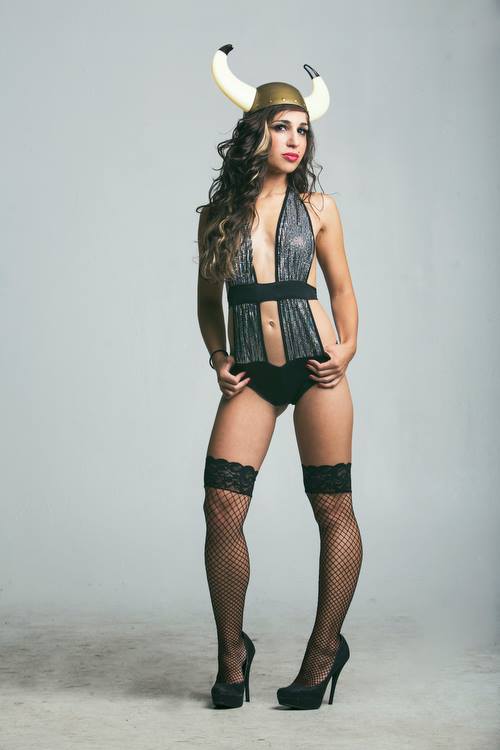“Porn opera” is a stretch but delivers a happy ending

Sarah Screams appeared in Gordon Beeferman’s “The Enchanted Organ: A Porn Opera” Thursday night at Drom. Photo: Steve Prue
There is never enough irreverence in opera, so works like Gordon Beeferman’s The Enchanted Organ: A Porn Opera are always welcome. Couple that with, as the title indicates, a mockery of the inherent absurdities of pornography, and integrate burlesque into the concept and staging, and most everyone is guaranteed to enjoy a happy ending.
The Enchanted Organ is still in-progress, and Beeferman and director Beth Greenberg presented selected scenes Thursday in a one-night only show at Drom in the East Village. That was the second half: the crowd, lubricated with alcohol, was stimulated by an opening burlesque show, itself with operatic overtones. Along with an amazing act by contortionist Topher Bosquet, some flashy theremin playing by Cornelius Lloyd, and a striptease from emcee and porn star Chris Harder (who, costumed as a giant hot dog, entered to the doo-wop strains of the Oscar Mayer Wiener theme), Dangrrr Doll stripped off her armor, fondled her sword and flapped her extravagant wings to the “Ride of the Valkyries,” and soprano Sarah Screams removed her corset, and much more, while singing a bel canto version of Khia’s “My Neck, My Back” (totally NSFW).
In the second half, the time and space available were sufficient for only a distorted experience of the opera—or the pressures of time and preparation away from the stage distorted the quality of some of the music. While there was not enough material to render a comprehensive judgment, there was plenty to make one look forward to the finished version.
Harder set up the story and narrated in the interstices, like title cards in a silent movie. The lead character, Avery Dick, arrives fresh off the bus in Pornoland and, with his polymorphous perversity and one particular talent, becomes a star. There are obvious details borrowed from Midnight Cowboy and Boogie Nights, but Beeferman and librettist Charlotte Jackson turn them into original, funny, satire.
The opening suffered the most from the presentation: soprano Marcy Richardson sang scales and wordless lines to a pastiche medley of snatches of music from nineteenth century operas, while doing a striptease that arouses Dick (tenor Jonathan Blalock). While an effective means for talent-scouting, the quality and pace of the music was frenetic and eventually numbing. This carried over into the next scene, where Dick impresses porn producer Jared Rothko (bass Joe Chappel), and a star is born.
The problem in that scene, and a later cabaret song from brothel owner Lady Honeysuckle (James Jackson), is the overwhelmingly wordy libretto that tries to tell us everything that is going on. There’s not enough time, and there’s not enough space for the music to breathe and to give the audience some idea of what is going on outside the words.
But when the libretto is neither dialogue nor lecture, the true nature of The Enchanted Organ shines through, and it’s intriguing and impressive. Given good verse, Beeferman has always been a terrific composer for the voice, especially for ensembles.
There were two successful, satisfying scenes. The first was set at a porn movie awards event, where Dick is challenged by reigning, veteran star Helmut Langeschlange (bass Matthew Curran, so good that one hopes the complete role will be more fully fleshed out). Pulling out a tape measure—and then a graduated cylinder—Langeschlange challenges Dick in what should go down in history as the “Measuring aria,” an excellent piece that is set in an ideal range for the singer, has a strong da capo structure, and is not just funny but witty. The libretto rhymes “centimeters” with “peters” and intelligently uses the cylinder as a means to measure displacement.
The finale to the performance—impossible to tell if it’s also the intended finale to the opera—was a great ensemble piece for Blalock, Richardson, and Chappel (later joined by Screams). Beeferman’s music is in superb Italian baroque style, with hints of Handel, and added a violin to the ensemble of keyboards (Beeferman, who also conducted), bass and drums. The mood of the music, the beautiful period costumes, and the content were right out of Chaucer and Boccaccio: the three initial singers represented different sexual organs, with Blalock as the male member having to choose between two alternatives.
Both please him temporarily before their drawbacks—fertility and fertilizer, according to the libretto—appear. An ear offers himself, but is unsatisfactory. Fortunately Screams, as the mouth, appears to save the day, and everything works out in the end. Musically, this was finely done, the artifice making the ribaldry that much more hilarious.
Beeferman is realizing this work with a terrific cast. Richardson and Screams are immediately impressive because they combine familiar talents—singing, physical beauty and confident sexuality—in unfamiliar juxtaposition. Blalock is a fine charming tenor (he was a compelling lead in Gregory Spears’ Paul’s Case at last winter’s Protoype Festival), and Chappel expresses easy dignity in the midst of the most extreme buffoonery.